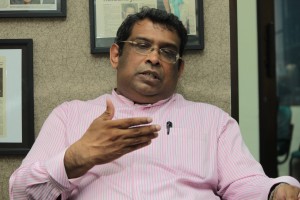by TK Tan
Johor’s love and hate relationship with Singapore is well known, with Johor mostly doing the disparaging. However, economic reality weighs heavily in Singapore’s favour.
Norman Fernandez, Johor DAP deputy chairman, points out that JB’s prosperity is dependent on Singapore. According to the World Bank’s ‘Malaysia Economic Monitor 2011 Report – Brain Drain’, up to 176,000 people are estimated to travel to and from Singapore daily for work and studies. Most of them stay in Johor Bahru (JB).
“A big amount of FDIs in JB comes from Singapore. However, Singaporean investors are now spoilt for choice in the region in terms of better and cheaper investing destinations. In addition, Singapore is also Malaysia’s biggest source of tourist arrivals, the majority of them passing through JB.” he said.
“As long as economic lure is on the Singapore side, many Malaysians will choose to work there, whether they stay there long-term or commute daily from JB. JB has an important role to play in the two countries’ economic ties.”
A constant gripe for JB folks is the poor transportation linkage with Singapore. There is no seamless travel and efficient public transport to ferry people from JB’s surrounding area to the customs checkpoints, unlike in Singapore where public transportation system is efficient.
“Many Malaysians are forced to drive their own vehicles into Singapore,” he remarked.
“We need to revamp JB’s transportation system. The joint development of the MRT system connecting Singapore and JB is long overdue. However Johor state government’s poor urban planning is handicapping that ideal.”
Bad planning
JB, particularly its downtown commercial centre, has also become a victim of poor infrastructural thinking and planning.
According to the Malaysian Insider (24 January 2012), local businesses in JB have been hit by the shift in Singapore tourists after the new Custom, Immigration and Quarantine (CIQ) complex and a direct route to the North-South Expressway from the Second Link in Tuas were built in 2008 and 2007 respectively.
The Causeway’s share as an entry point for tourist arrivals dropped from 82 per cent in 2007 to 64 per cent in 2008 while the Second Link’s share shot to 29 per cent.
“Today many Singaporeans can drive through the Second Link and head for Melaka and other places bypassing JB altogether. JB has tired features that don’t attract the Singaporean tourists anymore,” he opined.
“JB is like a cowboy town, where the Singaporean visitors come for a day trip and not much else. The new attraction spots such as Legoland in Nusajaya may stir some interest, but we need to transform our appeal in the long haul.”
“We need to repackage JB as a wholesome family attraction, much like what Golden Sands and Marina Bay has done for Singapore,” he elaborated.
Rethinking The Approach
The antagonistic posture adopted by both countries in their bilateral ties, especially in regards to the Causeway and other issues has not helped to facilitate economic ties. In the past Malaysia has been sabre-rattling about removing the Causeway and cutting water supply to Singapore.
“In dealing with Singapore, we have to work on a win-win mentality. Crying that we need to protect our sovereignty is good; we need to acknowledge that Singapore also needs assurance from Malaysia in some areas,” Fernandez opined.
“Singapore needs water and sand from us and we want a fair price for them; put in place a proper pricing mechanism to execute it. Malaysia on the other hand needs smoother Causeway linkage. Let’s work on that.”
“Singapore will gladly reduce traffic on the Causeway if we can build the MRT and ferry JB commuters seamlessly to and from Singapore as the Lion City is also getting more congested by the day,” he elaborated.
“We need to sit down, rethink the priorities and see each other as partners and not competitors in order to progress.”
“Definitely Singapore will drive a hard bargain. Malaysia however, can accommodate in some areas in fostering our economic ties with them.”
“Having a take-it-or-leave-it attitude is not conducive for progress. Regardless of what happens now, it is the people who is being held hostage by the politicians’ antics,” he said. –The Rocket




